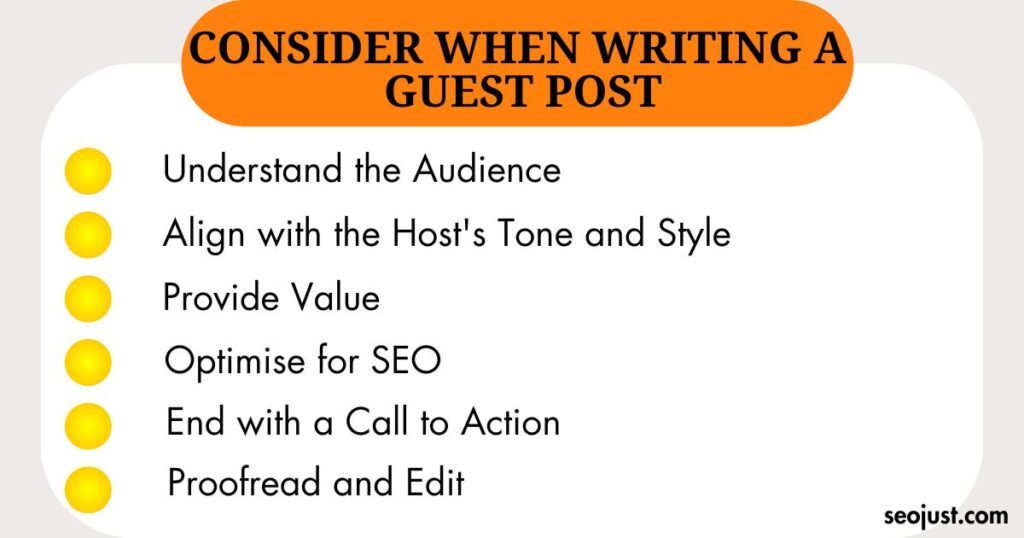Guest Posts: This method involves writing and publishing an article or blog post on another website. This process is called guest post. The main purpose is to provide valuable content for the host site’s audience while inserting a link back to your own site. Guest posts are a planned way to reach new audiences, build relationships within your industry, and increase your site’s power through backlinks.
Niche Edits: Different guest posts vs. niche edits, niche edits include your links into existing articles or content on another site. This could be through updating old posts, adding new sections that include your link, or simply inserting your link into relevant existing content. Niche edits allow you to leverage the established authority and relevance of existing content, potentially providing quicker SEO benefits without the need to create new articles.
Exploring Guest Post

What is a guest post?
A guest post is mostly a piece of content like an article or blog post that you write and then publish on someone else’s website or blog, comparatively than your own website. The core intention behind writing a guest post is twofold. First, it purposes to offer insightful, engaging, and valuable content to the host website’s audience. This not only benefits the host by inspiring their content but also positions you as an authority in your niche.
Second, within this content, you strategically place a link back to your own site. This practice serves multiple purposes. It exposes your brand to a larger audience, fosters relationships within your industry, and most highly from an SEO position, secures a backlink from a recognized site. These backlinks are essential in boosting your website’s authority and, so, its search engine rankings.
Also Read: A Comprehensive Guide to SEO For Construction Companies
How Do I Get Guest Posts?
Getting guest posts includes a strategic method that starts with researching and identifying websites or blogs within your niche that accept guest content. Once a list of potential hosts is collected, the next step is to understand their content guidelines and audience interests to ensure your contribution would be a good fit. Making a personalized outreach email that introduces you, and your website, and pitches a content idea that adds value to the host’s website is essential.
Highlight how the post would benefit their audience and why you’re the right person to write it. Remember to follow up humbly if you don’t hear back originally. Building a relationship and networking with other bloggers in your niche through social media and industry events can also pave the way for guest posting opportunities. Persistence, quality content, and an honest approach are key to successfully securing guest posts.
The benefits of guest posting for SEO
- Enhances Domain Authority: Guest posting on trustworthy sites can increase your site’s domain authority, making it more truthful in the eyes of search engines.
- Direct Traffic: By attainment a wider audience through guest posts, you can drive direct traffic to your site via the fixed links.
- Link Building: Each guest post provides a chance to secure a backlink, which is dominant for improving your site’s SEO.
- Brand Visibility: Regular guest posting increases brand mindfulness and helps establish your brand’s company in the industry.
- Networking Opportunities: It opens up streets for networking with other industry influencers and bloggers, development relationships that could be helpful for future collaborations.
- Social Media Shares: Attractive guest posts are likely to be shared on social media, more increasing your reach and potential backlink bases.
- Increased Credibility: Paying valuable content to confident sites increases your credibility as an industry expert.
- Keyword Rank Improvement: Carefully placing target keywords within your guest posts can help in improving your rankings for those keywords.
- Content Portfolio Variation: This allows you to expand your content portfolio, showing your skill in various areas related to your industry.
- Improved Writing Skills: The process of creating guest posts can improve your content creation and SEO skills, making each following post more effective.
Best Practices to consider when writing a guest post

- Understand the Audience: Before writing, make sure you carefully understand the host site’s audience. Your post should provide to their interests and needs to ensure appointment.
- Align with the Host’s Tone and Style: Each website has its unique tone and style. Adjusting your post to match these aspects can increase the possibility of your guest post being accepted and respected by the host site’s audience.
- Provide Value: Your guest post should offer valuable information, insights, or perspectives that are not already covered extensively. It should purpose to educate, inform, or interest the readers.
- Include High-Quality External and Internal Links: While you’re main goal might be to include a link back to your site, addition other high-quality external links (where relevant) and internal links to the host site’s content can improve the value and SEO of the post.
- Optimise for SEO: Use relevant keywords logically within your content to help advance the search engine ranking of your post. However, avoid keyword stuffing as it can negatively affect readability and SEO.
- End with a Call to Action: Inspire readers to engage further by ending your post with a call to action. This could be attractive comments, suggesting they visit your site, or hopeful them to share the post on social media.
- Proofread and Edit: Before submission, carefully proofread and edit your post to ensure it is free of grammatical errors and typos. High-quality, polished content reproduces well on you and increases the chances of being asked to guest post again.
Exploring Niche Edits

What is a niche edits?
A niche edit, also known as a “contextual backlink,” involves inserting a link into an already existing article or page on a website, rather than creating a new guest post. This method can be particularly effective for SEO, as the existing content may already have authority and traffic. By strategically placing a backlink in relevant, established content, you can leverage the pre-existing page’s strength and audience, directing more focused attention to your site.
Niche edits can be a quicker route to gaining valuable backlinks, mainly if the content is closely allied with your target audience or industry. However, it’s important to ensure that these edits add value and relevancy to the original content to maintain the honesty and usefulness of the host site.
How Do I Get Niche Edits?
In the quest for securing niche edits, remembering the human element behind every website and piece of content is crucial. Beyond the technical steps and strategies lies the essence of genuine connection and mutual respect. Upcoming each potential niche edit with sympathy, and understanding the goals and challenges of the site owners or editors, can transform a simple outreach effort into a speaking collaboration.
It’s about more than just safeguarding a link; it’s about fostering a partnership that can lead to continued growing and opportunities for both parties. By ordering the relationship over the deal, you accept a mindset that not only improves your SEO endeavors but also contributes positively to the digital community.
This approach underlines the importance of human connection in the digital realm, serving as a reminder that behind every email, proposal, and piece of content, there’s a person, with goals, tests, and the potential for meaningful communication. So, as you embark on your niche edit journey, remember to keep a personal touch and gain the people behind the pixels.
Also Read: Technical SEO Audit Services Tailored To Your Website Needs
Advantages of using niche edits for SEO
- Immediate Authority: Niche edits allow you to tap into the existing authority of a page, benefiting instantly from its established trust and credibility.
- Efficiency: Unlike guest posting, who requires creating content from scratch, niche edits involve addition your link to current content, making the process more time-efficient.
- Less Effort for Content Creation: You don’t need to spend hour’s preparation, writing, and editing an article. You simply find a slot in an existing piece where your link adds value.
- Higher Relevance: By selecting content closely related to your niche, you can ensure the backlinks are highly relevant, which is a critical factor for SEO success.
- Increased Organic Traffic: Inserting your link into a popular, existing article can drive more focused, organic traffic to your site.
- Cost-Effective: Niche edits can be more cost-effective compared to other link-building strategies, primarily if you negotiate direct placements without intermediaries.
- Smoother Approval Process: Site owners may be more open to making a simple edit to add a link, rather than taking the time to review and publish a whole new guest post.
- Building Relationships: Engaging with website owners for niche edits can help in promotion long-term relationships, opening the door for more collaboration in the future.
- Enhanced User Experience: By adding links to extra useful information, niche edits can improve the user experience of the current content, making it more valuable to readers.
- Quick Impact: Given the established SEO value of the host content, your site can experience quicker improvements in search results compared to building new content from the ground up.
Guidelines for Niche Edits
- Ensure Relevance: Always ensure that the content you demand to add your link to be highly relevant to your niche. This not only increases the possibility of your edit being accepted but also ensures that the resultant traffic is targeted and beneficial to your site.
- Quality Over Quantity: Focus on safeguarding niche edits in high-quality, confident articles rather than a large number of low-quality links. A few high-value edits can have a more important impact on your site’s authority and search rankings.
- Respect Content Integrity: When suggesting edits, ensure that your additions or alterations do not compromise the integrity and flow of the original content. Your edits should flawlessly integrate and add value without looking forced or out of place.
- Offer Up-to-date Information: One compelling reason for site owners to accept your niche edit is the addition of updated information. Propose edits that correct outdated facts or add recent developments related to the topic.
- Be Transparent: Communicate your intentions and the mutual benefits when reaching out for niche edits. Transparency about your link’s drive and the value it adds can build trust and enable talks.
- Focus on Building Long-Term Relationships: Approach each niche edit opportunity as a chance to build a long-term qualified relationship. This mindset can lead to more opportunities and partnerships in the future.
- Monitor and Report Back: After your edit has been published, monitor the performance and share any notable results with the site owner. Reporting back can demonstrate the value of your edit and reinforce the positive impact of your collaboration.
Which is Better Guest Posts Vs. Niche Edits?

The discussion between the efficacies of guest posts vs. niche edits is complex, with each strategy possessing its unique strengths and potential weaknesses. Guest posts offer a platform for original content, allowing brands to insert their voice straight into new audiences and build authority through quality, informative pieces. This strategy supports long-term SEO goals, enhancing both the brand’s visibility and its perceived expertise within the industry.
On the other hand, niche edits provide a quicker, often more straightforward boost to SEO by inserting links into pre-existing, high-authority content. This can be especially beneficial for generating immediate traffic and leveraging the established trust of popular websites.
Choosing between guest posts vs. niche edits boils down to the specific objectives, resources, and timeline of your strategy. If the goal is to build long-term authority and establish a brand as a thought leader, guest posting may be the preferable route. Conversely, for more immediate SEO improvements and leveraging existing content authority, niche edits could be more effective.
Finally, a balanced approach that includes both strategies, aligned with a clear understanding of the desired outcomes, tends to produce the best results. This blend not only fuels SEO growth through varied strategies but also improves the brand’s content ecosystem, holistically driving engagement and authority.
Case Studies
Real-world examples of successful guest posting
Real-world examples of successful guest posting abound, highlighting the strategy’s effectiveness in pretty visibility, authority, and SEO. For instance, Buffer, a social media management tool, meaningfully increased its customer base and website traffic through a focused guest blogging strategy. By publishing over 150 guest posts in a year, Buffer saw its daily signups more than double.
Another example is Greg Ciotti of Help Scout, who utilized guest posting on high-profile sites to drive tens of thousands of new visitors to Help Scout’s website. These cases highlight how delivering high-quality content on reputable platforms can not only boost website visits but also, more importantly, enhance brand recognition and authority within the industry.
Through strategic guest posting, both Buffer and Help Scout established themselves as thought leaders, demonstrating the tangible benefits of a well-executed guest blogging strategy.
Successful niche edit campaigns
Successful niche edit campaigns have demonstrated their effectiveness in bolstering both the visibility and authority of websites within their specific niches. For example, an SEO agency managed to enhance its client’s organic search visibility by strategically placing niche edits in highly relevant, authoritative content across a variety of domains.
This effort resulted in a significant uptick in referral traffic and improved keyword rankings. Another notable campaign was conducted by an online retailer, which saw a marked increase in both site traffic and sales after their niche edits were incorporated into existing high-traffic posts related to their products.
These instances underscore the potential of niche edits to not only improve SEO metrics but also drive tangible business outcomes through careful selection and placement of links in existing content.
Future Perspectives
Predictions on the future relevance of guest posts and niche edits
The evolving dynamics of SEO and content marketing suggest that both guest posts vs. niche edits will continue to be integral to digital marketing strategies. However, their relevance and efficacy are likely to evolve. For guest posting, the emphasis on quality, originality, and audience engagement is expected to intensify. Sites and search engines are becoming more adept at identifying and penalizing low-quality content, pushing marketers towards more meaningful and high-quality contributions.
Meanwhile, niche edits may see increased scrutiny for relevance and authenticity, as search engines enhance their algorithms to better understand the context and quality of links. Despite these challenges, niche edits that are carefully chosen and genuinely add value to the existing content can continue to offer substantial SEO benefits. In conclusion, both strategies are poised to remain valuable, particularly for those who prioritize quality, audience value, and strategic alignment with brand goals.
Conclusion
In the intricate dance of digital marketing, both guest posts vs. niche edits play pivotal roles. They complement each other, addressing different needs and objectives within a comprehensive SEO and content marketing strategy. Guest posts allow for creative expression and direct engagement with new audiences, laying down the foundation for enduring brand relationships and authority building.
Niche edits, while more subtle, leverage established credibility and direct traffic, often providing a quicker SEO boost. The landscape of digital marketing continually evolves, with search engines sharpening their ability to assess content quality and relevance. This evolution demands a more nuanced, quality-focused approach from marketers.




